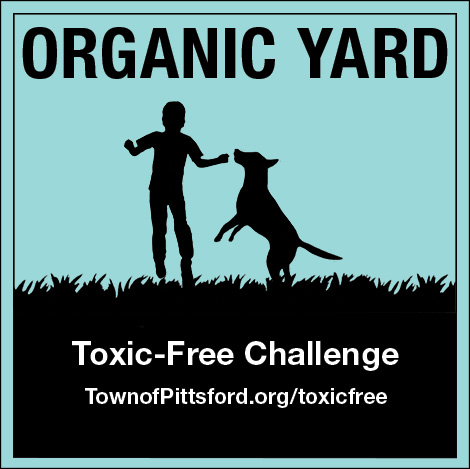Responsible Lawn Care & Toxic-Free Challenge
For an opportunity to skip the chemicals, see our Toxic-Free Challenge info below!
There are many approaches to caring for your lawn. Whether you choose extensive or low maintenance efforts, synthetic or organic lawn care products, caring for your lawn in a responsible manner is important not just to your yard but to the overall environment. Below are some tips for responsible lawn care and information about how you can chose a toxic-free lawn care approach.
The Town is committed to this approach as well. We’ve reduced our use of such materials and use them only when absolutely necessary – every year, on all 3,000+ acres the Town maintains, the Town uses a smaller amount of chemical herbicides and pesticides than just one house on a half-acre lot that employs a lawn service.
And for additional information on how you can beautify your yard while you help our local pollinators, check out our Pittsford Pollinator Pathway page. Our Pollinator Pathway program invites residents to plant native, pollinator-friendly species and create connected habitat corridors throughout the community. The Town plants native whenever feasible – you can find native pollinator gardens at several of our parks and facilities.
An Opportunity to Skip the Chemicals
Some residents choose to forego chemical treatments in favor of organic lawn care options. Whether you choose to go completely organic or are working toward minimizing your use of synthetic lawn chemicals, the tips below can help you cultivate a healthy lawn that is healthy for the environment. Many thanks to the engaged residents who initiated the Toxic-Free Challenge and passed along this information to the Town.
Pittsford Challenge for a Toxic-Free Neighborhood
Join your neighbors and skip the synthetic chemicals this year
Re-evaluate your lawn contract
- Avoid non-organic pesticides and herbicides
- Organic-slow release fertilizer, only in the fall
- Avoid lawn-stressing spring & summer applications
- Skeptical? Try skipping pesticides one year and see
Choose the right plants
- Fescues for shade
- Blue and rye for sun
- Try non-grass ground covers
Mow correctly
- 3 inches or higher
- Return clippings to lawn
- Keep blades sharp
Develop healthy soil
- Chemical use can destroy a healthy soil ecosystem
- Add a top layer of organic material such as composted manure instead
- Aerate every 1-2 years
Water correctly
- Only in the early morning, if at all
- Deep watering of 1” weekly to encourage deep roots
- Use a tuna can to measure sprinkler output
Consider native plants
- Try replacing some of your grass with native trees, shrubs and flowers
- Native plants need no water, very little care, and no chemicals
Patch bare spots quickly
- Weeds love bare ground
Other Toxic-Free Tips
Killing Weeds with Household Vinegar and Dish Soap
- Mix regular household white vinegar (5% acetic acid concentration) with a few drops of liquid dish soap.
- Treat while the area to be treated is dry and in full sun.
- Spray directly on young or newly emerged weeds. Weeds will dry out and die.
- This approach works best with young/newly emergent weeds.
- While the mixture burns on contact and will kill the above ground plant parts that it touches, it won't kill the roots of older, more established weeds, thus allowing weeds to re-sprout.
- Take great care if using horticultural vinegars (with higher acetic acid concentrations) - these can burn skin, cause eye damage, and are especially damaging to any toads or other creatures shading themselves beneath the weeds.
Alleviate Mosquitoes in Your Yard with These Simple Healthy Tips
If mosquitoes in your yard are bugging you, it might be tempting to use a chemical spray treatment. But spraying your yard with chemicals can harm you, your kids, your pets and your neighbors. The chemicals also can harm birds and insects that eat the mosquitoes and pollinate your yard. To deal with mosquitoes – and to prevent them from overtaking your yard – consider opting for some healthier solutions to alleviate mosquitoes in your yard.
Some healthier solutions to alleviate mosquitoes in your yard
To keep you from being bitten:
- Use oil of lemon eucalyptus (OLE). Data shows OLE-based repellants are just as effective as the synthetic DEET formulations.
- Use fans on your deck to blow mosquitoes away; this also helps make it harder for mosquitoes to trace target scents from us.
- Wear long sleeves.
To prevent mosquitoes from breeding in your yard:
- Keep removing standing water from your yard all summer long – and pass along this tip to your neighbors.
- Check for and remove standing water from various places in your yard, including under flowerpots, inside wheelbarrows, and on plastic surfaces.
- Replace downspout extenders that harbor water in the corrugated surface
- Don’t forget to check and clean out your gutters throughout the summer.
- For areas with standing water that can’t be eliminated, use BTI mosquito dunks; they’re inexpensive, effective, and easy to use – just place them in areas that hold water. They contain a naturally occurring bacteria only kills mosquito larvae.
These above tips can help you enjoy your backyard in more comfort while keeping it healthier for you, your family, your pets and wildlife!
Further Sustainable Landscaping Info & Resources
The Department of Environmental Conservation (DEC) Sustainable Landscaping website has extensive information about green yard and garden tips, selecting native plants and resources for a chemical free yard. Visit www.dec.ny.gov/public/44290.html to learn more.

